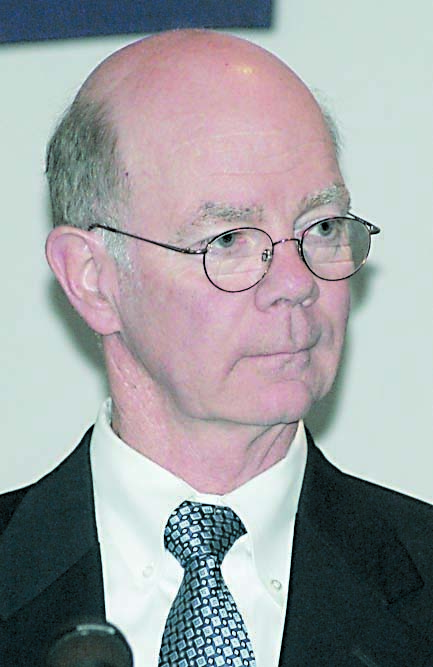PORT ANGELES — A ballot measure to make Port Angeles a second-class city would go before voters in November 2017, according to state statute, unless the City Council votes to put it on the upcoming general election ballot, City Attorney Bill Bloor said Thursday.
Bloor, who is reviewing the legality of the Our Water, Our Choice! petition for an election, said he hopes to determine the legality of the petition and offer options regarding a possible ballot measure to City Council members by their June 28 meeting.
“That would be a goal,” he said.
State law requires that the election be held at the next general municipal election in November 2017.
But the City Council could vote to have it on the Nov. 8 ballot, Bloor said.
The deadline for filing resolutions for the fall general election ballot is Aug. 2.
Our Water, Our Choice! wants to change Port Angeles city government from a code city to its pre-1971 status as a second-class city.
If voters approve it, residents would lose initiative and referendum powers, according to the nonpartisan Washington Municipal Research & Services Center (MRSC).
The petition was prompted by the City Council’s 4-3 decision Dec. 15 to continue fluoridation of city water until June 2026 “in order to elect a full new City Council,” according to the petition wording.
Bloor has said his reading of state statutes is that an election of an entirely new City Council would not be required if the city reverts to second-class status.
The petition effort was fueled by dissatisfaction among fluoridation opponents toward Mayor Patrick Downie, Deputy Mayor Cherie Kidd and Councilmen Brad Collins and Dan Gase, known by critics as “The Fluoride Four,” who voted to continue fluoridation.
Collins, Gase and Downie are up for election in November 2017, and Kidd cannot run for re-election when her term is up in 2019 under the city’s three-term limit.
Our Water, Our Choice! expects that, if voters approve a ballot measure based on the petition, all council members, including those elected in November 2017, would undergo an extra election outside the regular schedule set by state law.
Prefers election this year
Petition organizer Eloise Kailin of Sequim, who is president of Our Water, Our Choice!, said Thursday that the group prefers a Nov. 8 election rather than waiting until 2017.
“The faster we get this behind us, the better everyone will be,” Kailin said.
“I believe it’s in the City Council’s interest as well as the community’s best interest.
“The Fluoride Four is not wanting to ask me for my advice.”
Kailin said she will make a statement to the City Council about the petition at the council’s regular meeting at 6 p.m. Tuesday at City Hall, 321 E. Fifth St.
Downie was unavailable for comment Monday.
Change for community
He called reverting to second-class status “a horrendous change, a step back for this community,” in a June 5 interview with the Peninsula Daily News.
Code cities have “broad authority in all matters of local concern,” while second-class cities have “only those powers expressly or implicitly granted by the Legislature,” according to the MRSC.
No city in the state has changed from a code city to a second-class city, according to the MRSC, which said the city would lose home-rule charter powers if the change is adopted.
Opponents say fluoridation of city water contributes to bone and other health problems and should be administered as a matter of choice, while proponents see fluoridation as an effective public health measure against tooth decay.
While a Nov. 8 election date for a ballot measure is preferable, a November 2017 ballot measure date “gives us more time to argue our position,” Kailin said.
Clallam County Auditor Shoona Riggs said earlier this month that the petition has enough valid signatures to bring the question before voters.
The petition had 1,012 signatures but needed 467 signatories to meet requirements such as Port Angeles residency and valid voter registration.
Fluoridation foes were incensed that the City Council majority did not abide by an unscientific fluoridation survey of city water customers who pay water bills — not all water users — in which 43 percent of those receiving the 9,669 surveys responded.
Of those, 56.64 percent were opposed to the continued fluoridation of the city’s water.
The same majority that voted for fluoridation would have to agree to hold the election to change city government Nov. 8.
________
Senior Staff Writer Paul Gottlieb can be reached at 360-452-2345, ext. 55650, or at pgottlieb@peninsuladailynews.com.
